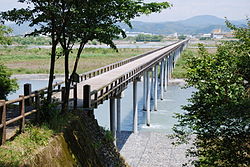Shimada (島田市 Shimada-shi) is a city of 96,000 people (2020) in Shizuoka prefecture.
Understand
[edit]
The economy of Shimada is primarily agricultural, with green tea as the main crop. Light industries of Shimada include factories for the production of automobile components.
Climate
[edit]The area enjoys a warm maritime climate with hot, humid summers and mild, cool winters.
Tourist information site
[edit]The local tourist association has a Japanese-only guide site with integrated Google Translate.
Get in
[edit]By train
[edit]- 1 Shimada Station (島田駅). A station on the Tōkaidō Main Line of Central Japan Railway (JR Tokai).
- 2 Kanaya Station (金谷駅, Kanaya-eki). On the Tōkaidō Main Line, 213 km from Tokyo Station. It is also a terminus of the Ōigawa Railway’s Ōigawa Main Line.
By bus
[edit]- Shizutetsu Just Line
- Shimada City Independent Service Bus
- Mount Fuji Shizuoka Airport
Get around
[edit]See
[edit]- 1 Hōrai Bridge (蓬莱橋). It was constructed in 1879 with a length of 900 m.
- 2 Oi Shrine (大井神社), 2316 Oimachi. A Shinto shrine that enshrines the spirit of the Oi River and is known for the Shimada Grand Festival (Obi Festival) held for three days in mid-October once every three years (years of the tiger, snake, monkey, and boar).
- 3 Fuji no Kuni Tea Museum (ふじのくに茶の都ミュージアム), 3053-2 Kanayafujimicho. F-W 09:00 to 17:00. ¥300.
- 4 Suwahara Castle ruins (諏訪原城, Suwahara-jō). The ruins of this Sengoku period yamashiro-style Japanese castle in the Kanaya neighborhood are a protected national historic site. The original plan of this 300 m by 200 m castle clearly remains. The site is about a 30-minute walk from Kanaya Station on the JR East Tokaido Main Line.
Do
[edit]- Ōigawa Railway’s Ōigawa Main Line. A variety of historical locomotives and carriages are used, both for the steam and for the electric services, making the line a favourite with train enthusiasts and photographers. It runs 40 km to Senzu station.
Buy
[edit]Eat
[edit]Drink
[edit]Sleep
[edit]Connect
[edit]Go next
[edit]| Routes through Shimada |
| Hamamatsu ← Mori-Kakegawa ← | W |
→ Fujieda-Okabe → Shizuoka |

